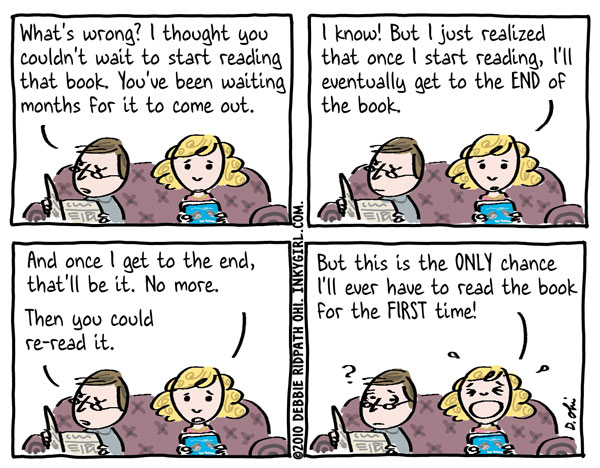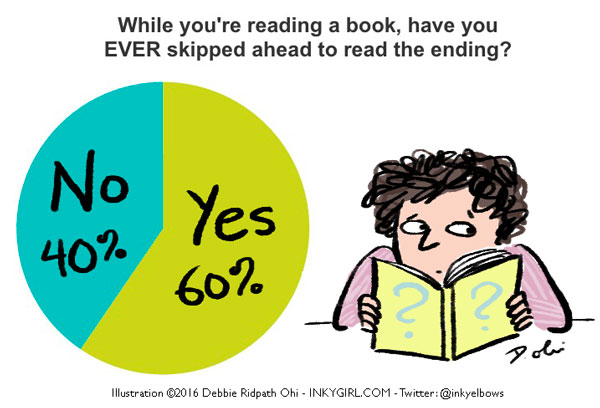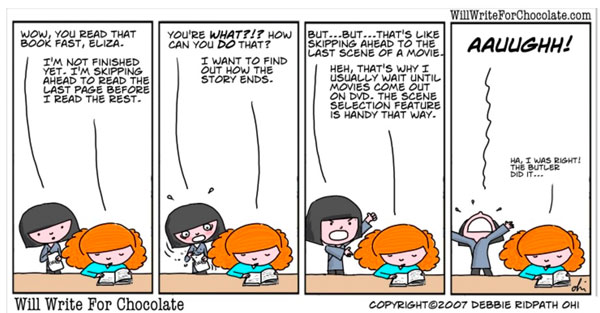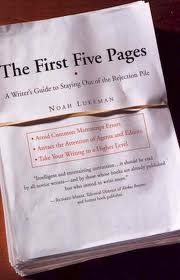

Thanks to all who responded to my most recent poll, which asked "While you're reading a book, have you EVER skipped ahead to read the ending?"
Out of 126 respondents, 60% (or rather 59.52, rounded up) of you replied YES, with the remaining 40% saying NO.
Why did you skip ahead?
67% of you said it was because you were enjoying the book but found it so tense that you felt compelled to read the ending before going back and reading the rest. 47% said it was because they weren't sure if they liked how the book was going, so wanted to find out if it was worth reading to the end. The remaining 35% of you said it was because you weren't really enjoying the book but had to read it (for whatever reason), so needed to know how it ended.
Most of the comments elaborated on the reasons above. A surprising number of you said that you read the ending first on a regular basis, that you don't mind spoilers, that knowing where a book is heading actually enhances your reading enjoyment. Sometimes you want to know if a favorite character in a book or series is going to be killed off.
Some of you said it was because you were reading late at night and had to go to sleep but still wanted to finish the book.
Some of you were horrified at the idea of skipping ahead to read the ending, couldn't imagine how ANYONE would ever want to do this.
Two of my favorite comments about why some of you skip ahead to the ending:
"Because I needed to prepare myself if Harry, Ron, or Hermione died!"
"I am, at my basest levels, an impatient cheat."

Curious about my other publishing industry surveys? Feel free to browse current and past Inkygirl Surveys online.
Endings or beginnings? Which are more important? Neither. They are both crucial.
The first thing to notice is that these two points in a narrative must be intimately connected. The story problem you set up must be the same story problem that you solve. When you’re revising a novel, you must check these two point to decide if you went off track somewhere.
If the main story problem is peace in a family that is fighting, the ending can’t be that the family goes off on vacation together. The reader doesn’t know if the family will fight during that vacation or not. They might indeed go off on vacation, as the denouement or the aftermath of the climax, but this isn’t the climax. The climax or high point of the plot must be a family confrontation that solves some basic problems and restores a semblance of peace.
When you’re faced with a disconnect, it doesn’t matter which you change, the beginning or the end; but you must change one of them, these must match up.
 It is important to begin well, to draw the reader into your fictional world. The First Five Pages by Noah Lukeman rightly argues that you only have five pages–at the most–to capture an agent, an editor or a reader. Often, you only have one page. So, beginnings are crucial. They set the stage, introduce character and setting, and most important, Hook the Reader. Lukeman’s book is an excellent guide to getting those pages right.
It is important to begin well, to draw the reader into your fictional world. The First Five Pages by Noah Lukeman rightly argues that you only have five pages–at the most–to capture an agent, an editor or a reader. Often, you only have one page. So, beginnings are crucial. They set the stage, introduce character and setting, and most important, Hook the Reader. Lukeman’s book is an excellent guide to getting those pages right.
On the other hand, it is also important to end well. The end of a sentence, paragraph, chapter and novel are places of emphasis or stress. Consider the difference between these sentences:
The circus featured elephants and a great trapeze act, all presented in the center ring.
Featured in the center ring of the circus was a trapeze act performed above an elephant act.
In the first sentence the elephant/trapeze acts were buried in the middle of the sentence. Pulling them to the end, emphasizes their importance. Likewise, look at the ends of your chapters. Do you dribble off into nothing, or do these make memorable statements that pull readers to the next chapter? And what are the last lines of your stories? Memorable?
Read 100 Famous Last Lines from American Book Review (pdf)
Read my analysis of 100 opening lines here.
Which is more important, the beginning or ending of your novel? Both. Make sure you nail both of these crucial sections (and everything in between).
Blog: Darcy Pattison's Revision Notes (Login to Add to MyJacketFlap) JacketFlap tags: conflict, novel, authors, deus ex machina, write, revise, rose, starr, how to, external, internal, ending, caroline, protagonist, Add a tag
Debut Novelist Prunes her RosebushIntroduced first in 2007, debut children’s authors have formed a cooperative effort to market their books. I featured Revision Stories from the Classes of 2k8, 2k9, 2k11 and this year, the feature returns for the Class of 2k12. Guest post by Caroline Starr Rose, author of MAY B., MG, January 2012 My first-round edits arrived with a four-page letter attached. In it my editor praised my writing (“This story is like a prize rosebush that needs just a bit of pruning!”) and pointed to some “thorns” that needed work. (From Darcy: Ha! Notice Caroline’s last name.)
My original ending was contrived. It just didn’t work. In order to change this, I had to weave bits into the beginning of the story to make the ending more plausible, and I had to be okay with leaving the outcome/redemption of one character, Mr. Oblinger, open ended. This was hard, as I really believed in his motives (even if they didn’t play out as he anticipated), but in keeping with an ending that wasn’t “artificial or improbable”, there was no room for this. Tying the Revision Process TogetherThroughout the revision Add a CommentBlog: Adventures in YA Publishing (Login to Add to MyJacketFlap) JacketFlap tags: Craft of Writing, Kat Zhang, Ending, Climax, Add a tag
Kat's advice is sound. Here's my takeaway: 1) Have the protagonist solve the final problem. 2) Make sure the protag has earned any victory through growth, courage, self-sacrifice, and hard work. 3) Ensure all tools the protag and antag use have been woven and layered in throughout the book. 4) Take time for wrap-up in the denouement, hinting at how the protag's growth will change the world around her going forward. Read the full article: http://letthewordsflow.wordpress.com/2010/04/22/guest-article-endings-and-climaxes/ And for further information on climaxes and endings: http://writingforstagescreen.suite101.com/article.cfm/writing_great_endings_the_climax http://www.creativejuicesbooks.com/creative-story-writing-cliffhangers.html http://thedarksalon.blogspot.com/2009/10/act-climaxes-turning-points-plot-points.html http://www.writersdigest.com/article/use-casual-writing-to-connect-the-dots/ http://www.writersdigest.com/article/3_Tips_for_Writing_for_Kids/ http://www.helium.com/items/1456842-fiction-writing-writing-a-plot-climax-novel-action-ending-a-book Write a satisfying climax, Martina Add a Comment |
You always compile the best sites. Your efforts do not go unnoticed. Thank you.
Thank you, Sheri! That's so good to hear. I love blogging about sites that I want to keep track of -- that way I can find them when I need them, too, and hopefully they help other writers along the way.